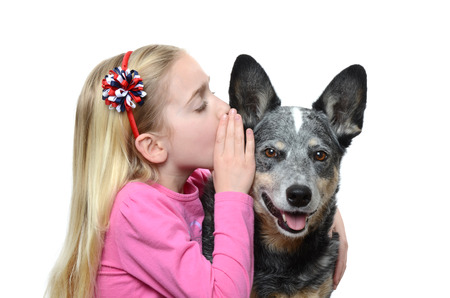Man’s best friend may not speak our language, but can he understand it? Does your dog really know that when he plants his butt and sits nicely on the ground when you tell him to “sit,” that he is, in fact, sitting—or does he just remember that if he does that, he gets a treat?

Scientific research into whether or not canines can actually process human language has been growing in abundance over the past several decades. It seems that we’re all desperately hoping our pup knows what we mean when we assure him that he’s the most adorable and loved boy on the planet (because what dog isn’t?!). To give you an idea, we’ve scraped the surface of some of those studies to find out what’s probably going on in your dog’s furry little head.
So, can my dog understand me when I talk to him? Sort of.
While a dog does not process human speech the exact same way as we do, the way in which they do analyze language is very similar to ours. Their brain functions similar to a human’s in that the right-side processes emotion, while the left processes meaning.
A couple of years ago, a scientific study conducted in Hungary was published in which researchers used an MRI machine to peer into the inner-workings of a dog’s brain while they spoke to them. Thirteen dogs were trained to lie still in an MRI scanner—voluntarily and without restraint—and their brain responses were observed when presented with certain types of speech.
Scientists noted that both sides of a dog’s brain are active in interpreting human language. By playing around with different words and intonation, they determined that the left side comprehends what we say while the right side understands how we say it. The dogs only reacted entirely happy when receiving praise delivered with both positive words and intonation.
When hearing for example, the phrase “good boy” in a neutral tone, only their right brain was active—because they recognized that the words were complimentary, but the tone was not. The opposite was found to be true when random phrases made up of meaningless words— “you are a dog” for instance—were used in a praising tone of voice. The dogs were able to recognize that though the tone was significant, the words were not. Scientists could therefore conclude that a dog processes human speech in terms of both emotion and meaning.
Dogs can identify certain words and phrases.
Do you spend your time and energy trying to learn advanced medical terminology if you don’t work in the medical field? No, you don’t—because it’s not relevant to you. Dogs appear to have a similar philosophy, conscious or not. They tune out words that they haven’t learned as meaningful or applicable to them.
Think about it: if you’re telling your spouse that the dog needs to go for a walk, you might have to spell out the word “walk,” to stop your dog from getting overly excited, indicating he knows what the word signifies. But you can’t turn to your yellow lab and say, “take out the trash,” and expect him to know what you mean. Dogs usually recognize consistently used words of praise, discipline and command. To him, “do you want a treat?” is meaningful, discernible speech, while, “did you file your tax returns?” is not.
Along those same lines, dogs are able to distinguish between meaningful words and gibberish as well.
They recognize body language.
The journal PLOS ONE published a study in 2012 that investigated the ability of a dog to understand nonverbal cues from humans. Their research demonstrated that dogs can read basic body language, expressions, and determine when they are being addressed directly.
In an experiment, dogs were presented with two different plates of food, one larger than the other. Without any humans in the room, most of them went for the bigger helping; however, when people came in and reacted outwardly positive toward the smaller portion, the dogs were able to distinguish that and switched to the smaller portion accordingly, determining based on the body language and facial expressions they observed which plate was more desirable.
So, does your dog know what you mean when you tell him you love him or that he’s the best boy in the whole world? For all intents and purposes, yes, he does. Can he understand when you admit to him, compelled by guilt, that you were the one who stole the last peanut butter cookie from the bowl and blamed it on him? Probably not—you’re still in the clear.
While a dog’s capacity to understand us when we speak may be up for debate, we are certainly able to decipher what they are trying to communicate to us. These messages may include but are not limited to: “Play with me!”, “Pay attention to me!”, “That’s my steak now!”, and most importantly, “I love you!”.
Get the conversation going with a puppy of your own and contact Lankas Labs today!

